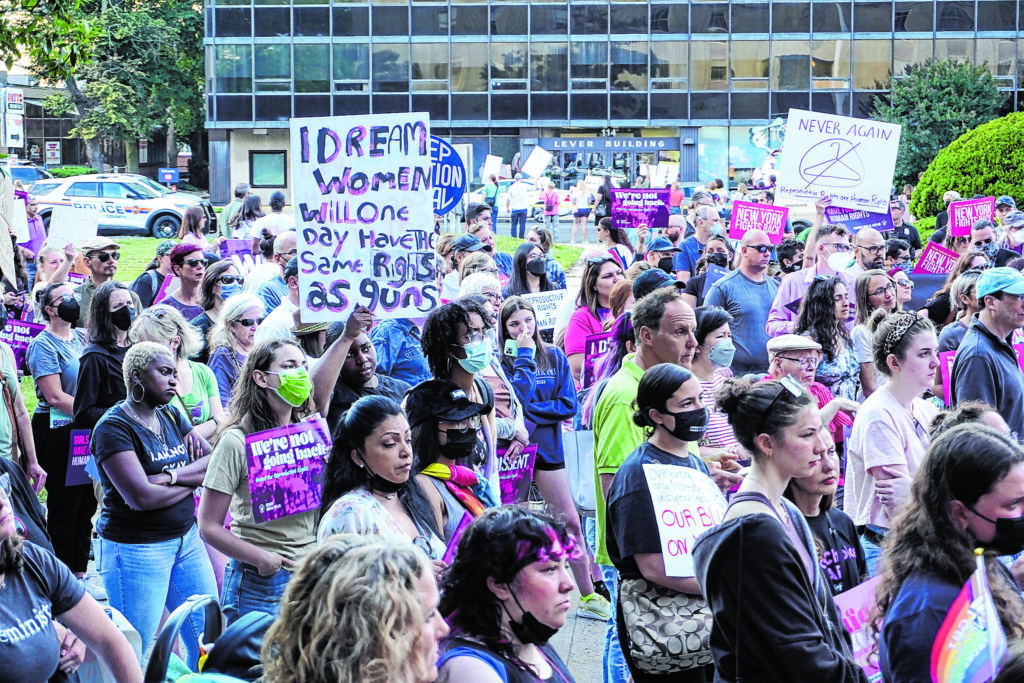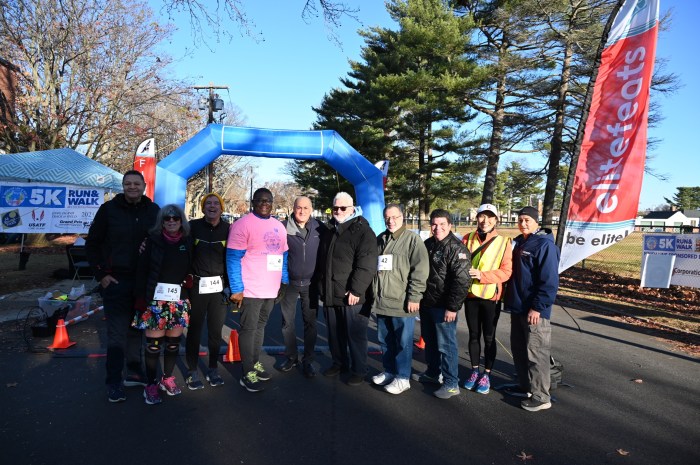
(Credit: Sean Ross Collins-Sweeney)
On Friday, June 24, around 150 people and numerous community and nonprofit groups gathered near Nassau County Courthouse to protest the landmark U.S. Supreme Court in Dobbs v. Jackson Women’s Health Organization, which serves to overrule both Roe v. Wade and Planned Parenthood v. Casey, two previous federal rulings that protected the right to pregnancy termination, a.k.a. abortion, in the United States.
Protesters took to the streets or gathered for vigils in cities and towns across the country, including in Mineola. At least 15 local political, human rights, and women’s organizations participated in the day-of “I Dissent” event, where demonstrators of all ages conveyed both grief and defiance in response to the ruling. Numerous elected officials were also present, including New York Attorney General Letitia James and State Senator Anna Kaplan.
On the day of the Supreme Court decision, members of Planned Parenthood of Greater New York (PPGNY) also handed out fliers near the group’s sole operational Nassau County clinic in Hempstead. A Planned Parenthood location in Glen Cove was one of 14 New York State locations that shut down a few months into COVID, and which is seemingly permanently closed. Another location, in Massapequa, is still under construction after a motorist drove into the location while it was closed; police have said they do not believe it was a targeted attack, according to PPGNY.
Based on an online search, this means that there are only two brick-and-mortar health providers in Nassau County at this moment that provide any termination care, outside of major hospitals: PPGNY’s Hempstead health center, and the All Women’s Care health center in Manhasset.
In preparation for the decision, New York Governor Kathy Hochul and other state lawmakers have set aside millions for programs to ensure pregnant people from New York or elsewhere can access this kind of care in the state. Local and national abortion funds have also been ramping up for the impact of the Supreme Court ruling and various ‘trigger laws’ now affecting already-limited access in numerous states. National and New York-based telemedicine companies have also ramped up their services and advertising in anticipation of an increased need for the at-home ‘abortion pill,’ which takes longer than surgical abortion but can offer patients more privacy and is currently much more accessible for many people (either way, it’s normal for patients to feel hormonal changes for weeks or months afterward).
The privacy-tied landmark Roe v. Wade ruling came in 1973, which makes it a relative grandparent in the history of civil and constitutional rights. As Dahlia Lithwick and Neil S. Siegel explained in an article in late June for Slate, “These rights include protection from involuntary sterilization, which the court upheld in 1927 during the eugenics movement; the freedom to access and use contraceptives, which was widely banned in the late 19th century and which the court did not begin to protect until 1965; the right of a nonwhite American to marry a white American, which was prohibited going back to the days of slavery and which the court did not safeguard as part of the fundamental right to marry until 1967; sexual intimacy between consenting adults in private, including same-sex intimacy, which was long regulated in American law and which the court did not protect until 2003; and the right to marry someone of the same sex, which existed as a matter of positive law in the United States beginning in 2003 and which the court did not vindicate until 2015.”
Regarding the latest Supreme Court decision, Governor Hochul said in a statement Friday, “Our state will always be a safe harbor for those seeking access to abortion care.” Nassau County Legislature Minority Leader Kevan M. Abrahams also commented in a statement, “The public health ramifications of this ruling will be enormous, especially for economically disadvantaged women who already struggle with access to healthcare. If we are to stop the backward slide that we are now witnessing in our nation, we must organize, mobilize, and vote – because our freedom and personal liberty are at the top of the ballot.”




























